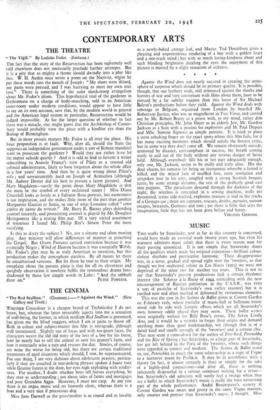CONTEMPORARY ARTS
THE THEATRE
" The Vigil." By Ladislas Fodor. (Embassy.) THE fact that the story of the Resurrection has been supremely well told elsewhere does not necessarily preclude further attempts. But it is a pity that so mighty a theme should dwindle into a play like
this. W. H. Auden once wrote a poem on the Nativity, where he put these words into the mouth of Joseph: " My shoes were shined, my pants were pressed, and I was hurrying to meet my own true love." There is something of the same shock-troop evangelism about Mr. Fodor's idiom. This hypothetical trial of the gardener in Gethsemane on a charge of body-snatching, told in an American court-room under modern conditions, would appear to have little to say on its own account, save that, by the modern world in general and the American legal system in particular, Resurrection would be judged impossible. As for the larger question of whether in fact there was a miracle, one might guess that the Archbishop of Canter- bury would probably view the piece with a kindlier eye than the Bishop of Birmingham.
But in more prosaic matters Mr. Fodor is all over the place. His basic proposition is at fault. Why, after all, should the State (he supposes an independent government under a sort of Roman mandate) want to prosecute the gardener ? Would they not rather have let the matter subside quietly ? And it is odd to find so fervent a writer subscribing to Anatole France's view of Pilate as a crusted old colonial administrator, likely to have forgotten about the whole affair in a few years' time. And then he is quite wrong about Pilate's wife; and unwarrantably hard on Joseph of Arimathea (although Mr. Aubrey Dexter did his best to present a fairer picture). And Mary Magdalene—surely the point about Mary Magdalene is that she must be the symbol of every reclaimed sinner ? Miss Diana Churchill looks as lovely as a Salvator Rosa portrait, but earnestness is not inspiration, and she makes little more of the part than another Marguerite Gautier or Sonia, or one of what Lemaitre called "cette espece de sainte du trottoir." Mr. Barry K. Barnes plays defending counsel sincerely, and prosecuting counsel is played by Mr. Douglass Montgomery like a resting film star. Of a very varied assortment of witnesses I found Mr. Philip Ray's Simon Peter the most satisfying.
Is this to decry the subject ? No, nor a sincere and often moving play. Any minister will allow differences of manner in preaching the Gospel. But Green Pastures carried conviction because it was essentially Negro ; Wind of Heaven because it was essentially Welsh. Mr. Fodor's play may be as truly American in intention, but this production makes the atmosphere stateless. By all means let there be unauthorised versions. But let them be true to their origin. My complaint about the present piece is that for all its cleverness and sprightly observation it nowhere fulfils the tremendous drama fore- shadowed by those few simple words in Luke: " And the sabbath






























 Previous page
Previous page